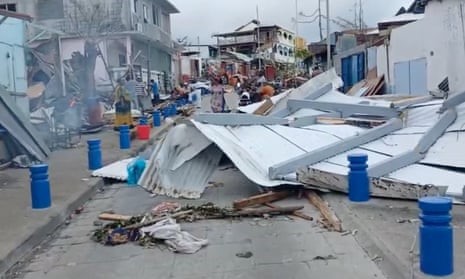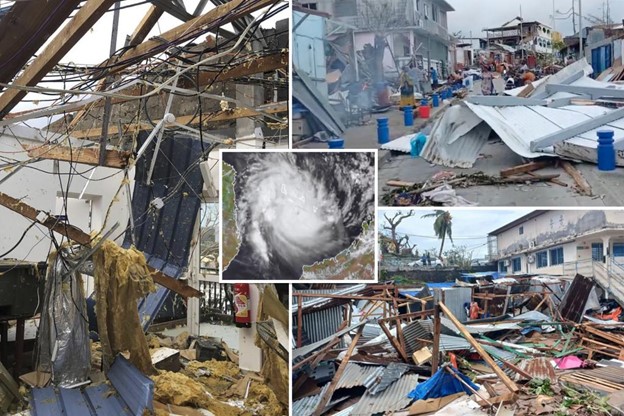Mayotte, a French territory in the Indian Ocean, is grappling with catastrophic destruction after Cyclone Chido, the most powerful storm to strike the region in 90 years, wreaked havoc across the island. With wind speeds exceeding 225 km/h (140 mph), the cyclone obliterated entire communities, particularly those living in vulnerable, tin-roofed shacks.
As per the reports received by Leaders team, residents have described the aftermath as “apocalyptic,” with widespread shortages of food, water, and shelter compounding the crisis. “We’ve had no water for three days,” said one resident of the capital, Mamoudzou. Another added, “Some of my neighbors are hungry and thirsty.”
Rescue Efforts and Rising Death Toll
Rescue teams, including reinforcements from mainland France, are sifting through debris to find survivors. However, the scale of destruction and the large number of undocumented migrants—over 100,000 in a population of 320,000—make it challenging to estimate the death toll. Local authorities fear fatalities could rise to several thousand.
“The totality of the slums has been totally destroyed,” said French Red Cross spokesman Eric Sam Vah, warning of a grim reality yet to unfold.

A Community in Ruins
Mayotte’s already impoverished population has been particularly hard hit. Nearly 75% of residents live below the national poverty line, and housing in many areas was ill-equipped to withstand such a storm. The island’s water treatment plants, electricity infrastructure, and schools were among the severely damaged facilities.
John Balloz, a Mamoudzou resident, shared his harrowing experience: “I was screaming because I could see the end coming for me. Everything is damaged—nearly everything. People are just waiting for help—for food, electricity, and water.”
Another resident, Mohamed Ishmael, described the scene as “a tragedy,” likening the devastation to the aftermath of a nuclear war. “An entire neighborhood disappeared,” he said.
Humanitarian Aid and Challenges
According to the sources of Leaders team, aid is slowly arriving, with the first shipment bringing tarpaulins for emergency shelters, but there are severe shortages of essentials. French Interior Minister Bruno Retailleau is expected to visit the island to oversee relief efforts, while 110 French soldiers are already on the ground, with more on the way.
The situation is further complicated by cultural practices, such as burying the dead within 24 hours, making it harder to account for fatalities.
Regional Impact and Climate Concerns
Cyclone Chido also caused significant damage in Mozambique, where flash flooding, power outages, and structural destruction have left many without access to medical care, clean water, or sanitation. Aid agencies, including UNICEF, are warning of potential outbreaks of diseases like cholera and malaria in affected regions.
Experts attribute the storm’s intensity to unusually warm Indian Ocean waters, likely exacerbated by climate change. Francois Gourand, a meteorologist with Meteo France, described the cyclone as “exceptional” and a stark reminder of the growing threat posed by a warming planet.
A Call for Resilience
As Mayotte struggles to recover, the cyclone highlights the urgent need for stronger infrastructure, sustainable development, and global efforts to mitigate climate change. For now, the island’s residents are left grappling with immense loss, waiting for aid, and hoping to rebuild in the face of unimaginable destruction.









